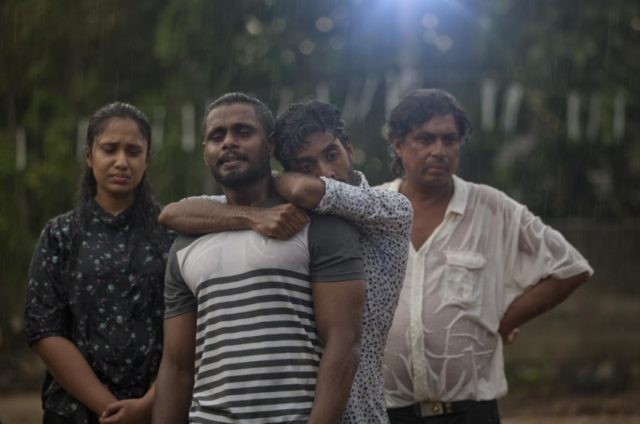Members of a Marxist opposition party in Sri Lanka filed a motion of no confidence against the entire government of President Maithripala Sirisena on Tuesday, condemning its inability to prevent the Easter Sunday jihadist attacks that killed over 250 people.
One month after the six suicide bombings targeting three churches and three hotels serving Easter breakfast, police continue to search for suspects tied to the Islamic State, which took responsibility for the attack, and National Thowheed Jamath (NTJ), the local organization that executed the bombings on behalf of the group. Leaders of NTJ continue to deny that their group maintained ties with Mohammed Zahran Hashim, the NTJ founder and believed mastermind of the attack.
Police confirmed through DNA analysis that Hashim died in the Easter bombings. He was the only jihadist who appeared without a face covering in an Islamic State video claiming the attack and praising jihad.
Janatha Vimukthi Peramuna (JVP, or People’s Liberation Front), a Marxist-Leninist minority political party, filed a motion of no confidence in the Sri Lankan Parliament on Tuesday against Sirisena, Prime Minister Ranil Wickremesinghe, and the Cabinet of Ministers for failing to prevent the bombings. All three claimed to have never received intelligence warning of an impending jihadist attack despite evidence surfacing that Indian intelligence officials had warned less than a month before the attacks that they had found evidence of a jihadist plot in the country. Hashim lived in India for years, uploading dozens of videos of impassioned sermons calling for violence against non-Muslims.
While the JVP is a fringe political party, at least one lawmaker – Sri Lanka Podujana Peramuna MP Namal Rajapaksa – has said he would support the no-confidence vote, according to Sri Lankan news outlet Ada Derana. Rajapaksa is the son of former President Mahinda Rajapaksa, whose power struggle with Wickremesinghe was widely accused of getting in the way of key government officials receiving intelligence on the Easter attacks.
Late last year, Sirisena abruptly removed Wickremesinghe and attempted to replace him with Rajapaksa as prime minister, a move the nation’s Supreme Court deemed unconstitutional while both men spent two months claiming to be prime minister. Following the struggle, Sirisena blocked Wickremesinghe’s cabinet from attending regular intelligence briefings; these cabinet members later leaked a letter they claimed intelligence officials received from India warning of the attacks.
The elder Rajapaksa, credited with ending the decades-long civil war between the government and Tamil separatists in 2009, still holds the title of “Leader of the Opposition” and remains an influential voice despite failing to take the prime minister position from Wickremesinghe.
Sirisena claimed that intelligence officials never presented that evidence at regular briefings, so Wickremesinghe’s team would have never seen it, anyway, as he himself allegedly had not. Sirisena demanded the resignations of Defense Secretary Hemasiri Fernando and Police Chief Pujith Jayasundara following the revelation of the letter.
A coalition of political parties also presented a no-confidence motion last week against Industry and Commerce Minister Rishad Bathiudeen featuring ten accusations related to the Easter attacks, including pressuring officials to release jihad suspects, “supplying empty shell casings to the copper factory owned by [one of the] suicide bomber[s],” and, generally, “strong links between the minister and the terrorists.”
Adding to concerns of individuals in the government with ties to jihadists, police this week arrested a parliament indexing officer for allegedly helping the NTJ establish a terrorist training camp.
Sri Lanka is a majority Buddhist nation with substantial Muslim, Hindu, and Christian minorities. In the immediate aftermath of the attacks, the government moved to curb the spread of fundamentalist Islam, though residents told local media in Kattankudy, the Colombo suburb where Hashim’s mosque is located, that it was too late – nearly a dozen mosques in the area were preaching Wahhabism or other fundamentalist schools of Islam. Sri Lanka expelled 200 foreign Islamic clerics following the attacks, banned the use of niqab and burqa, and has begun to process hundreds of more Muslims with expired visas in the country.
The Sri Lankan government has also turned to attempts at curbing Buddhist-led mob violence against Muslim communities. Mobs demanding Muslims leave their neighborhoods have beaten suspected Muslims and burned down their businesses, sometimes with alleged help from local police. The mobs have also accidentally targeted non-Muslims or damaged businesses owned by non-Muslims as fires spread uncontrollably in more densely populated areas.
Sri Lanka’s Christian population has yet to fully recover from the attack, which killed over 250 people and injured over 500. The terrorists reportedly targeted children in the churches, choosing to detonate closer to the back of the churches where parents often stand to be able to leave in case the child is uncomfortable. Churches remained closed for weeks, reopening for services two weekends ago with heavy security. Christian groups have reportedly organized memorial services to mark one month since the bombings.

COMMENTS
Please let us know if you're having issues with commenting.